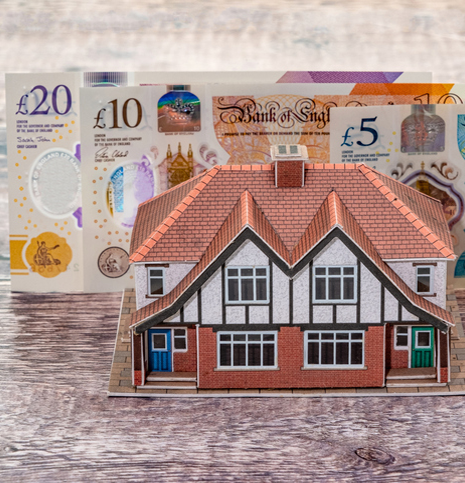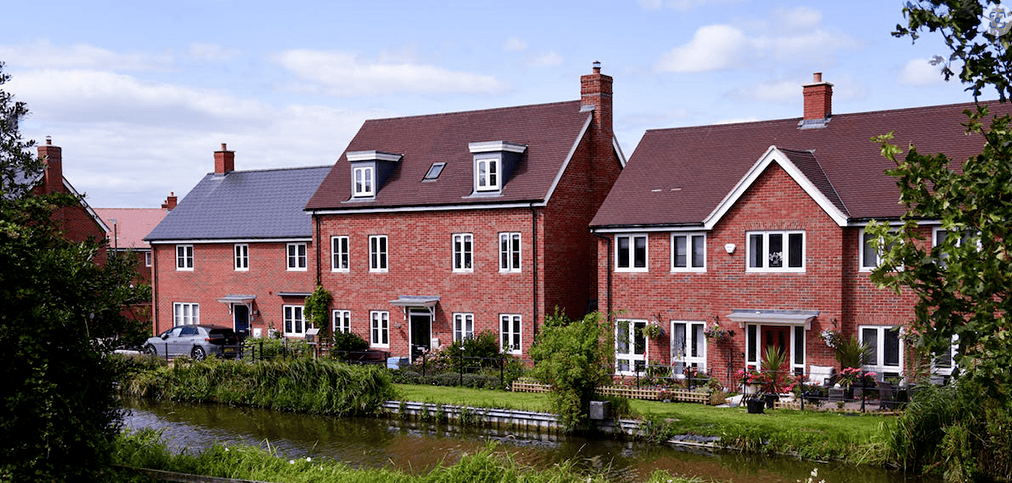Mortgage Deposit Calculator
To work out how much you will need to save each month to reach your deposit amount, try our calculator below.
This calculator is for illustrative purposes and you should check the progress of your savings and review it regularly to ensure you are on track to reach your amount by the target date.
You can also use this tool as a buy-to-let mortgage deposit calculator or to calculate your deposit savings for a residential property.
Below you’ll find information on mortgage eligibility and what satisfies a lender's requirements.
Saving for a deposit can be one of the biggest challenges of buying your first home. That's why it's a good idea to figure out how much you need for a mortgage deposit early on.
Fortunately, our mortgage deposit calculator can help. It will consider the price of the property you want to buy, the percentage you'd like to put down as a deposit, how much you have in savings already and when you aim to have your deposit saved. Using this information, the calculator will give you a clearer idea of how much you need to save each month to reach your deposit goal.
The Topics Covered in this Article Are Listed Below:
- Mortgage Deposit Calculator
- How to Calculate Mortgage Deposit
- Calculate How Much Deposit You Need to Save Each Month
- What Size Mortgage Can I Afford?
- How Much Deposit Do I Need to Buy a House?
- How Do Mortgage Lenders Decide How Much to Lend?
- What Mortgage Can I Get?
- How Can I Get a Bigger Mortgage?
- How Much Deposit Do I Need if I Have Bad Credit?
- Is Interest Calculated on a Mortgage After Deposit?
- Can I Buy a House Without a Deposit?
How to Calculate Mortgage Deposit
To calculate how much deposit you'd need, you simply take the property's cost and work out the percentage of the deposit you want to put down.
For example, a £100,000 property x 0.1 will give you £10,000 which is a 10% deposit. Or, £100,000 x 0.15 will give you £15,000 which is a 15% deposit.
Subtract this percentage from 100% for the LTV (loan-to-value) ratio. With a 10% deposit, you'd subtract 10% from 100% to have a 90% LTV mortgage. A lower LTV will mean better interest rates but does involve putting down a higher deposit.
Calculate How Much Deposit You Need to Save Each Month

Our mortgage deposit calculator below will help you determine how much you need to save each month to reach your deposit amount. It's easy to use. Just enter the following information and it will do the rest:
- Property price
- Percentage deposit
- Current savings
- Gross savings rate
- Date deposit is required
What Size Mortgage Can I Afford?

Our How Much Can I Borrow? calculator can help you work out the size of mortgage you might qualify for. Just enter your income details and employment status and the calculator will tell you how much you could potentially borrow.
After you've used the mortgage calculator to work out the maximum mortgage you could potentially borrow, you need to consider whether you can comfortably afford to make the monthly repayments.
You can check this by using our mortgage repayment calculator. This will tell you what your monthly payments might be, based on the interest rate. If you're concerned that the repayments may stretch your finances too much, you can use the mortgage calculator to determine how much you can borrow based on what you can realistically afford to pay based on your income.
How Much Deposit Do I Need to Buy a House?
The size of deposit you'll need to buy a house will largely depend on the property's price. A deposit will usually need to be at least 5% of the property's cost. But the bigger the deposit, the better. This is because the larger the deposit, the less you need to borrow – and therefore less interest you pay overall.
You'll have a greater chance of being accepted for a mortgage with a larger deposit. You'll also have access to lower interest rates, better mortgage deals and lower monthly payments.
Use our mortgage deposit calculator (UK) to work out how to save for a bigger deposit.
If you were buying a property worth £200,000, here's how much deposit you'd need based on different deposit proportions:
- 5% deposit: £10,000
- 10% deposit: £20,000
- 15% deposit: £30,000
- 20% deposit: £40,000
How Do Mortgage Lenders Decide How Much to Lend?
- Size of deposit - a deposit is the amount of money you can put down upfront to secure the property. Deposits are typically 10% of the property price. But certain lenders will give mortgages to some first time buyers with just a 5% deposit
- Your age - the older you are, the less time you'll have to pay off your mortgage before retirement. This means that your monthly repayments will be higher if you're on a repayment mortgage
- Your income - unsurprisingly, the higher your income, the more willing lenders are to lend you a larger amount
- Spending - mortgage lenders will want to see that you're responsible with money. If you have high debt and high expenditure, they'll be less inclined to let you borrow as much as you want
- Credit history - to get a mortgage, you'll need a good credit history. Several factors can boost your credit record, such as timely bill and credit card repayments. It's a good idea to keep on top of all your bills well before applying for a mortgage. You can also see how you look to lenders by checking your credit rating using Equifax or Experian
Lenders will also want copies of your payslips and bank statements to support your application.

What Mortgage Can I Get?
Once you know what you can borrow and the repayments you can afford, your next task is to compare mortgages rates. You'll have the choice of fixed rate mortgages, where your interest rate and monthly payment remain the same for the fixed period. Alternatively, you can choose a variable rate mortgage that tracks the Bank of England Base Rate. With this type of mortgage, your monthly payments can go up or down slightly each month. See our best buys to compare first time buyer mortgage rates on the market now.
Whatever kind of mortgage you get, fixed or variable, you’ll go onto your lender’s SVR (standard variable rate) when the introductory deal period ends.
SVRs tend to be more expensive than introductory rates, so you may want to speak to a broker about remortgaging up to 6 months before the end of your introductory rate period.
How Can I Get a Bigger Mortgage?
If the mortgage borrowing calculator gives you an amount that's too low to buy the home you want, you may want to consider some other options.
- Save for a bigger deposit - if you can only get a mortgage covering up to 80% of the cost of the property you want, you’ll need to save at least a 20% deposit
- Ask the Bank of Mum and Dad - if your parents are in a situation where they’re able to gift you money, then they may be able to contribute to your deposit and help you access better deals
How Much Deposit Do I Need if I Have Bad Credit?
Having a bad credit score doesn't necessarily mean you won't get a mortgage, but you may have to pay a higher deposit. While it varies from lender to lender, you may have to find a deposit of at least 25%. Each lender has its own criteria for calculating and assessing mortgage applications to determine the level of risk and how much they'd be willing to lend.
They'll want to look at:
- The type of adverse credit you have and how much you owe
- When the bad credit was registered
- If the debt is settled
- The circumstances surrounding or leading to the debt – e.g. divorce, death of a partner, loss of job, illness, etc.
- Your credit history
- The value of the property you want to buy
- Your income and employment type - whether retired, self-employed, employed or a contractor
- Your age
Is Interest Calculated on a Mortgage After Deposit?
Mortgage interest is calculated as a percentage of what you borrow. The deposit is excluded from the calculation. The interest is paid on the amount outstanding over the term of the mortgage.
Most residential mortgages are repayment mortgages. This means you'll be paying back some of the original amount you borrowed, plus paying the interest each month. If you make all your payments, you’ll have 100% equity in the property by the end of the mortgage term. However, most people remortgage onto a new deal when they come to the end of their introductory rate period as this is typically cheaper than going onto the lender’s SVR.
The longer the mortgage term, the more interest you'll have to pay overall. For instance, if you take out a mortgage of £200,000, you'll pay less interest over a 20 year mortgage than a 30 year mortgage.
There are also interest-only mortgages where you only make interest payments each month and don’t make any monthly capital repayments. This means you’ll still owe the original amount you initially borrowed at the start of your mortgage, until you pay it back via a repayment vehicle when you reach the end of your mortgage term or remortgage onto a new deal.
Can I Buy a House Without a Deposit?
Buying a house without a deposit in the UK, also known as a 100% mortgage, is possible but it works differently from a normal mortgage. This type of mortgage allows you to borrow the total cost of the property without putting down a traditional deposit.
No deposit or 100% mortgages are also known as Family Springboard or Family Assist mortgages. Many lenders have different versions of these products but they essentially work the same way: a family member of the borrower puts money into an interest-earning linked savings account with the lender or has a charge with no interest put on their property.
The money or equity acts as a placeholder deposit until the borrower has repaid a certain amount of the mortgage. The family member then receives their money back or has the amount taken off their property. The main risk here is that the family member could lose their savings or have their property repossessed should the borrower fail to meet their mortgage repayments.
There’s also a slightly different kind of no deposit mortgage called the Skipton Track Record Mortgage. Essentially, the lender uses your track record of making rent payments on time and in full for at least a year when considering your application. They do this instead of taking a deposit as security. When assessing how much you can borrow, the lender will look at your income and what you’ve been paying in rent. They’ll apply their own calculations and take the lower amount of these 2 to determine your maximum borrowing at 100% LTV.
House Deposit FAQs
How Do You Calculate the Deposit for a Mortgage?
Calculating your mortgage deposit is simple. First, look at the purchase price of the house you want to buy. Then, you'll need to look at the deposit percentage that lenders require. This will show you how much you need to save. You can use our deposit calculator for a quick look at how much you need to save each month to reach your goal.
How Much Deposit Do I Need to Buy a House?
Most mortgage lenders will require a deposit of at least 5% for a standard residential property. This means that you need to put forward 5% of the total property value as the deposit. This might be expressed as an LTV (loan-to-value) percentage, where a 5% deposit mortgage is a 95% LTV mortgage.
You might find that your minimum deposit amount is higher for other types of mortgage loans. For example, if you want to purchase a second home or a holiday home, your deposit minimum will be higher, around 20%. For a buy-to-let property, the usual minimum to get a loan is a 25% deposit. You'll also have to pay a higher deposit if you're looking at a non-standard property, or if you have a poor credit rating. This is because lenders will see these cases as higher risk investments.
How Much Deposit Do I Need if I'm Self-Employed?
If you're self-employed, you’re treated the same as an employed person. Therefore this won’t impact how much deposit you need to provide. The typical minimum deposit required by most lenders for a residential purchase is 5%.
Can I Buy a House Without a Deposit?
There are a few mortgage products available that let you buy a house without putting down a traditional deposit. Some of these products include Family Springboard, Family Assist and Skipton’s Track Record Mortgage.
How Can I Save Up More Per Month?
Once you have found out how much you need to save up per month, you can look at how to reach that goal. One of the best ways is to look at your income and expenses and see if there is anywhere that you can cut back - e.g. perhaps spending less on things like dining out, streaming services, subscriptions, etc.
Work Out How Much You Need to Save for Your Mortgage Deposit and How Long It Will Take You
Our deposit calculator is helpful if you want to see how long it will take you to save up a deposit to buy the property you want. If you think you'll struggle to save up in time, talk to us.
Here at John Charcol, our brokers can help you find loan options with lower deposit requirements, meaning you might be able to save up less and still buy the property you desire. Get in touch today to see how we can help.
How Much Can I Borrow?
This mortgage calculator examines your income and works out how much money a mortgage lender might provide you with
Loan-to-Value Calculator
On this page you’ll find our LTV (loan-to-value) calculator that you can use to work out the LTV on your mortgage.
Mortgage Deposit Guide
How much deposit will you need for your mortgage? We explain how mortgage deposits work, what LTV is, how your deposit affects your mortgage and more.
First-Time Buyer Mortgages
Discover the best first time buyer mortgage rates available and the latest advice from John Charcol: mortgage broker for first time buyers.
Family Springboard Mortgage or Family Deposit Mortgage
The Family Springboard Mortgage is one of multiple family deposit mortgages currently available. Learn all about it & other similar products here.
How to Save for a Deposit
Learn how to save for a deposit here. We go through things you can do, how long it will take, how much you need & even what no deposit mortgages there are.
